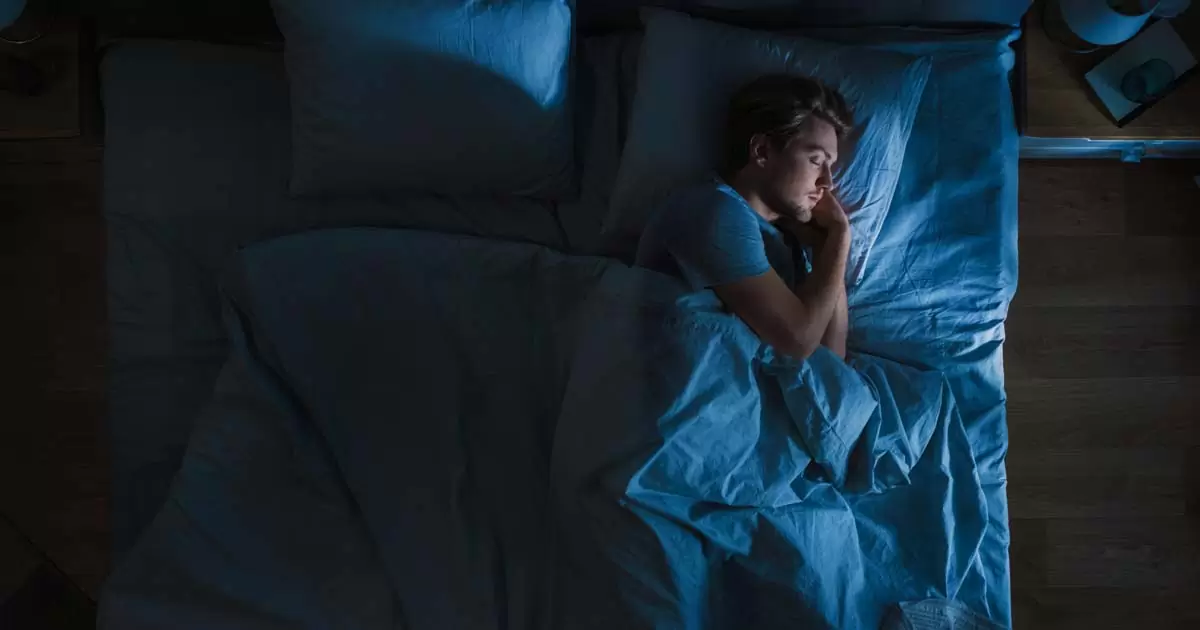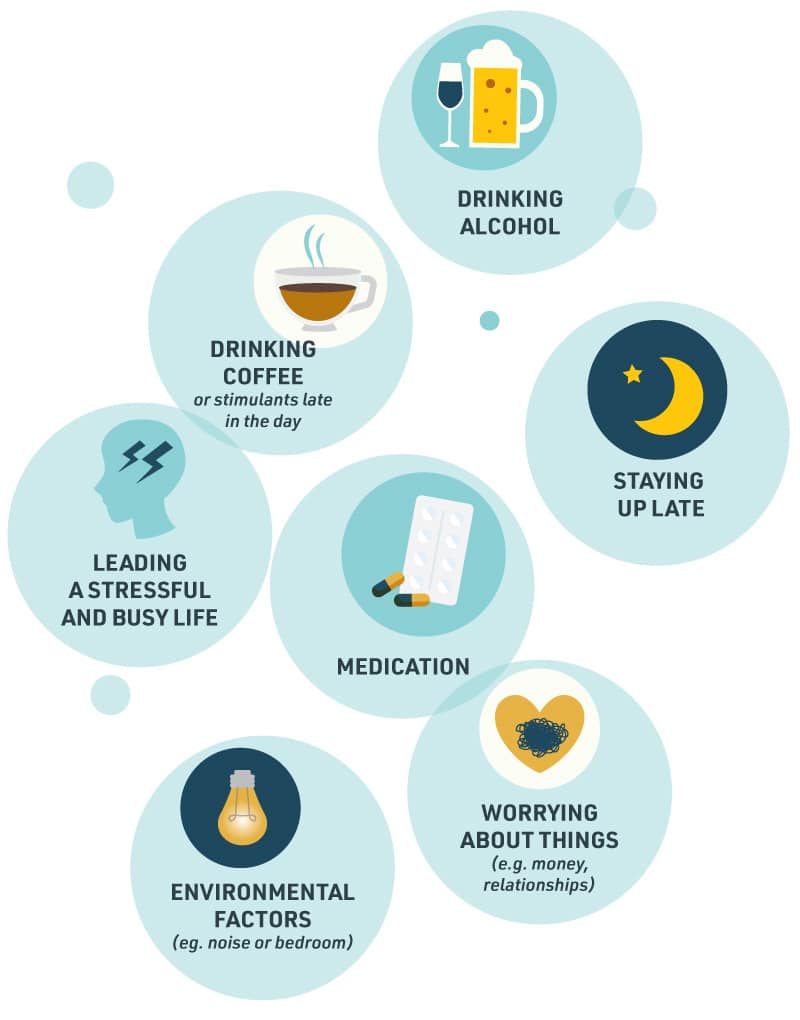
Sleep Strategies
Alcohol does not help us sleep better!
While it might help us fall asleep, it affects our quality of sleep
Let’s look at factors currently affecting your sleep and find some sleep strategies that work for you.
How alcohol affects sleep
Research suggests that when people who are heavy drinkers stop drinking, they can experience significant disruptions in their sleep.
They are struggling to get to sleep, stay asleep, or feel well rested after sleeping.
This is due to the withdrawal effects and our brains adjusting to not having alcohol as a regular sedative.
For heavy drinkers, their tolerance to alcohol would have built up over time.
Research shows that, for many heavy drinkers, while they are aware that alcohol disturbs their sleep, they feel they need it to get to sleep.
Alcohol use perpetuates sleep disturbance, which then leads to more alcohol use – making it really hard to escape the cycle.
Stress is a natural physical reaction that helps you to respond quickly and effectively under pressure.
Our body does this by revving up our nervous system and hormones to prepare for action.
Adrenaline and cortisol are the two main hormones that begin to pump through our system, speeding up heart rate, breathing rate, blood pressure and metabolism.
If the stress response goes on for too long (e.g. if you’re under the pump at work for months on end), this can take its toll on your mind and body.
Some people have a more sensitive stress response than others, much like a car alarm that goes off in the wind.
For many people who have stopped drinking, these kinds of issues with sleep can persist for months.
The good news is that research has shown that for most people, sleep quality improves slowly over time.
As our brains slowly adjust to the ‘new, new normal’, the patterns of sleep return to normal and we begin to see a re-emergence of REM sleep and a reduction in sleep issues such as early morning awakenings.
It can be helpful to think about how your own sleep is being affected by alcohol as this is different for everyone.
Some people may have concerns about giving up alcohol and how it will take away their ability to get to sleep. Others might be having sleep difficulties as a result of reducing their drinking. When you know about your issues with alcohol and sleep, you can see where your next step is to feeling better.
Being able to identify some of the factors affecting your sleep is an important step to start to make changes. It will be different for everyone, and also depends on what is happening in your life at the time.
Below are some common factors that contribute to problems with sleep:

What is affecting your sleep?
You might find the exercises in our ‘My Sleep Strategies’ activity sheet helpful
to see what is going on for you and your sleep.
Strategies to improve sleep
Sometimes it can take some time to get into a good sleep routine – so don’t lose hope! Good sleep is worth a bit of time and effort and you’ll see the results in your energy, mood and relationships.
Check out some useful sleep strategies below to help improve the quality of your rest. You might find the exercises in our ‘My Sleep Strategies’ activity sheet helpful to see what is going on for you and your sleep.
One of the most widely used and effective strategies for sleep issues is something called Sleep Hygiene. Sleep Hygiene is a collection of strategies that are proven to help us to get ready to go to sleep in a calm and relaxed way. Everyone will have different strategies that work for them.
Check out some of our suggested strategies here. You will find that some work better for you than others.
One of the most widely used Sleep Hygiene strategies are Sleep Rituals. You can think of your sleep ritual as a kind of ‘heads up’ to the more primitive part of your brain that it is time to start winding down.
As pleasant as it might be for us to ‘power down’ our brains (kind of like a smartphone!), in reality it takes a bit longer to reach the stage of being able to switch off and go to sleep.
Here are some ideas for sleep rituals to start doing in the evening in the 2 hrs before bed.
For a sleep ritual to be effective, it needs to be something that:
- is reasonably easy to do
- is something that you enjoy
- something that does not require a lot of extra effort, and most importantly,
- can reliably add to a feeling of calm and relaxation.
Stress can impact your sleep in many ways. If you have a lot on your mind, you might not be able to get to sleep. There is a reason why we use the phrase “losing sleep” over something. When you find you have a busy mind with worry it can be almost impossible to relax. People who suffer from chronic stress day in and day out have even more trouble sleeping due to not being able to relax their minds and bodies. With regular practice, mindfulness is an effective way to manage stress and remain calm. If you’d like to learn more about how to manage stress, check out our information pack on Relieving Stress. The Relieving Stress Activity Sheet links to mindfulness exercises/apps, to help quiet your mind and body.
Now that you know about some of the things that could be disrupting your sleep, as well as the role that alcohol is playing for you, let’s put some of those strategies into a plan of action. You can download a worksheet for your sleep plan in our ‘My Sleep Strategies’ activity sheet
As you begin to try these out, make sure you keep track of what works and what doesn’t. Some great strategies might be most effective in certain situations (e.g. meditation before bed when stressed), others will be great to use every evening (e.g. hot shower before bed, sleeping mask).
In summary
- Alcohol does not help us sleep better! While it might help us fall asleep, it affects our quality of sleep
- We may feel that we need alcohol to get to sleep, but after a few weeks of not drinking, most people are able to return to normal levels of sleep quality and can fall, and stay, asleep without the aid of alcohol
- Our brains need plenty of warning before we go to sleep
Want to learn more?
Organisations and Services
Apps
- Sleep Cycle Alarm Clock
- Sleep Genius
- Fitbit Sleep Tracker
- Pillow
Books and Articles
There are lots of great books and articles offering help. We have selected a few to get you started:
- Why do we sleep? – Book by Matthew Walker
- 19 Books to Read – Resource from Hello Sunday Morning
Find Support
If reading this brings up tough stuff for you, please talk to a trusted family member, friend, GP or one of the other services listed on our Find Support page. For additional support, we encourage you to follow the recommendations provided to you in your Personal Snapshot Report.






